Business Law: Exploring Contract Essentials and Company Law Principles
VerifiedAdded on 2023/06/11
|10
|3522
|154
Report
AI Summary
This report provides an analysis of several key aspects of business law. It begins with an exploration of contract law, focusing on the elements of a valid contract and remedies for breach, using a scenario involving misleading advertising of health products. The report then discusses the principle of separate legal entity in company law, referencing relevant case law to illustrate circumstances where courts may look beyond this concept. Finally, it examines shareholder litigation, contrasting the rule in Foss v. Harbottle with the statutory derivative action introduced by the Companies Act of 2006. Desklib offers a wealth of similar resources, including past papers and solved assignments, to aid students in their studies.
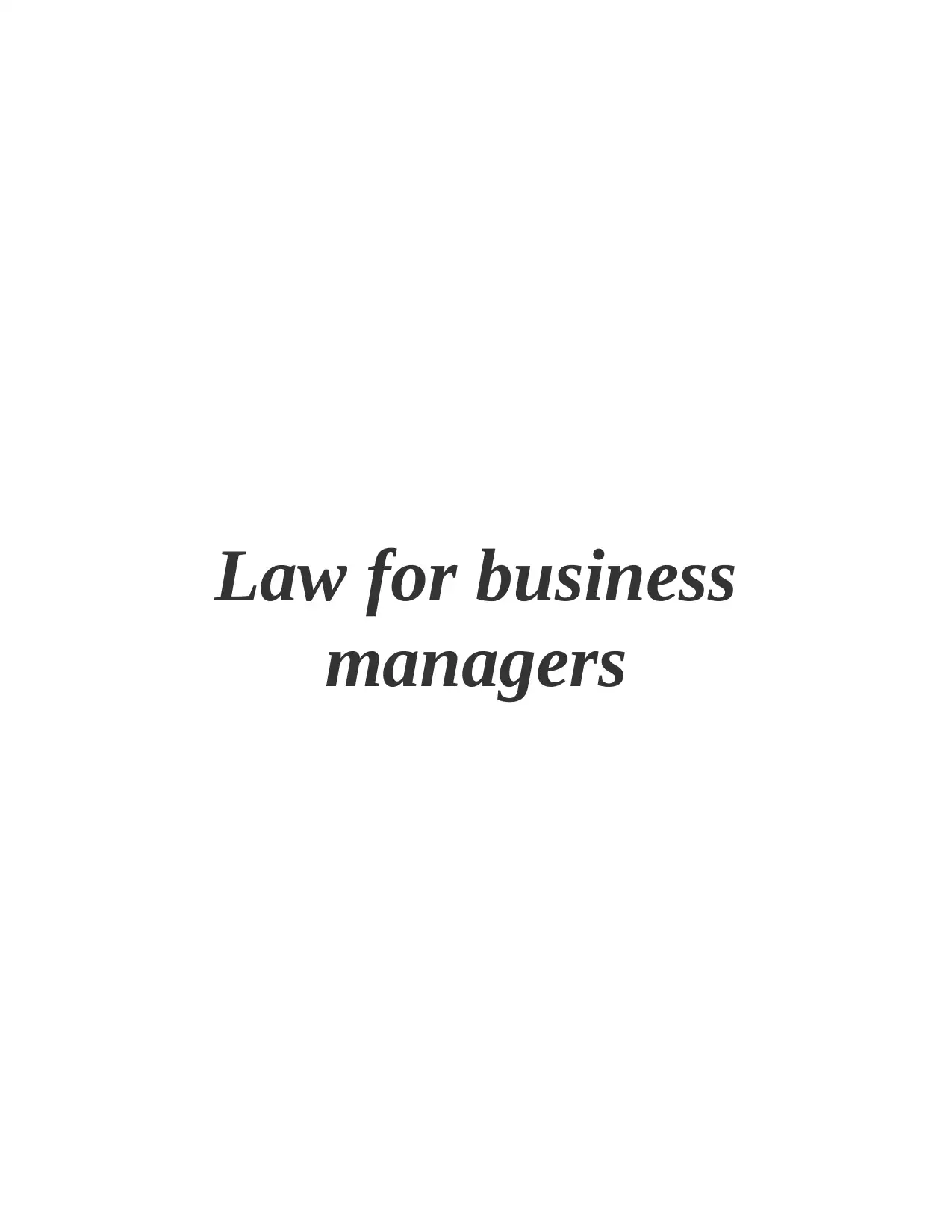
Law for business
managers
managers
Paraphrase This Document
Need a fresh take? Get an instant paraphrase of this document with our AI Paraphraser
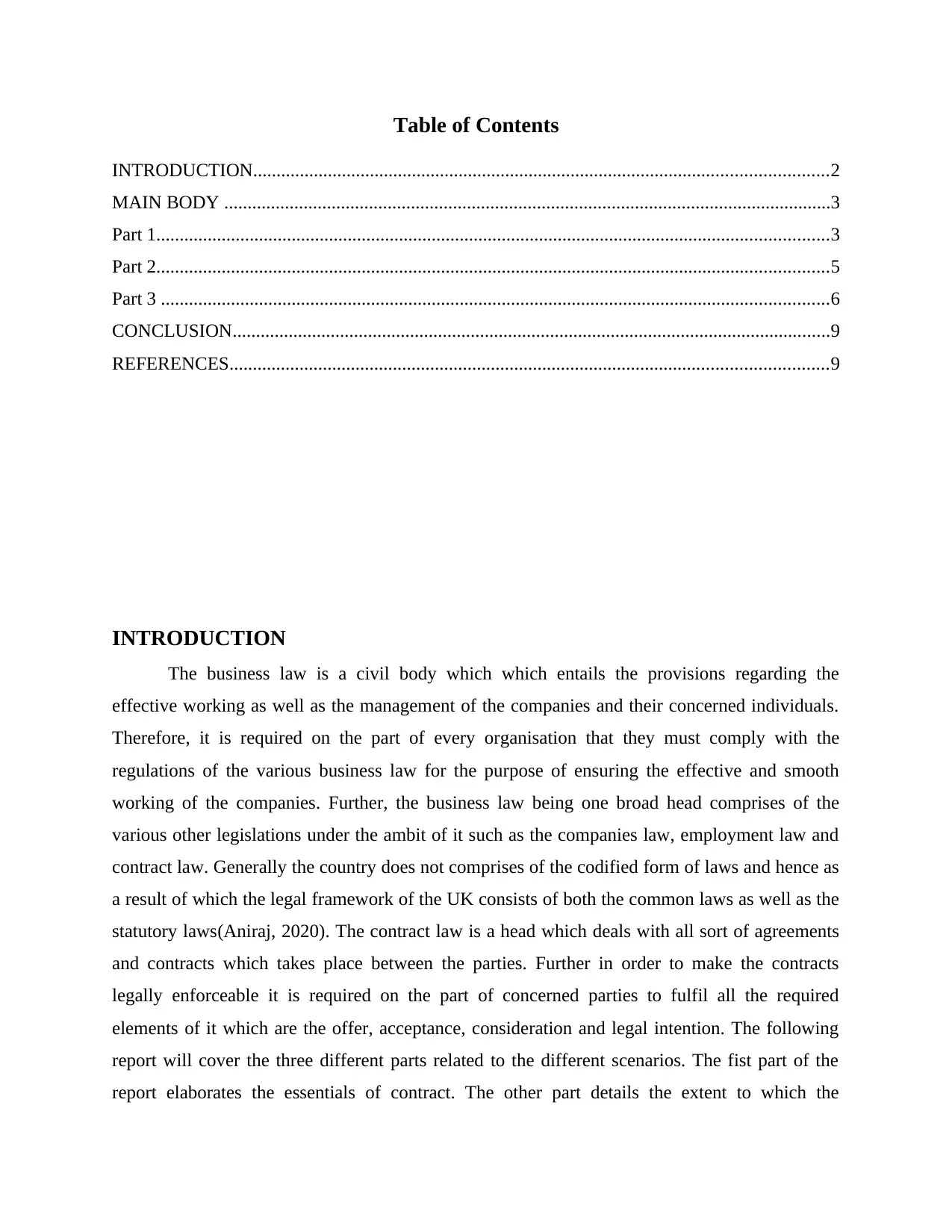
Table of Contents
INTRODUCTION...........................................................................................................................2
MAIN BODY ..................................................................................................................................3
Part 1................................................................................................................................................3
Part 2................................................................................................................................................5
Part 3 ...............................................................................................................................................6
CONCLUSION................................................................................................................................9
REFERENCES................................................................................................................................9
INTRODUCTION
The business law is a civil body which which entails the provisions regarding the
effective working as well as the management of the companies and their concerned individuals.
Therefore, it is required on the part of every organisation that they must comply with the
regulations of the various business law for the purpose of ensuring the effective and smooth
working of the companies. Further, the business law being one broad head comprises of the
various other legislations under the ambit of it such as the companies law, employment law and
contract law. Generally the country does not comprises of the codified form of laws and hence as
a result of which the legal framework of the UK consists of both the common laws as well as the
statutory laws(Aniraj, 2020). The contract law is a head which deals with all sort of agreements
and contracts which takes place between the parties. Further in order to make the contracts
legally enforceable it is required on the part of concerned parties to fulfil all the required
elements of it which are the offer, acceptance, consideration and legal intention. The following
report will cover the three different parts related to the different scenarios. The fist part of the
report elaborates the essentials of contract. The other part details the extent to which the
INTRODUCTION...........................................................................................................................2
MAIN BODY ..................................................................................................................................3
Part 1................................................................................................................................................3
Part 2................................................................................................................................................5
Part 3 ...............................................................................................................................................6
CONCLUSION................................................................................................................................9
REFERENCES................................................................................................................................9
INTRODUCTION
The business law is a civil body which which entails the provisions regarding the
effective working as well as the management of the companies and their concerned individuals.
Therefore, it is required on the part of every organisation that they must comply with the
regulations of the various business law for the purpose of ensuring the effective and smooth
working of the companies. Further, the business law being one broad head comprises of the
various other legislations under the ambit of it such as the companies law, employment law and
contract law. Generally the country does not comprises of the codified form of laws and hence as
a result of which the legal framework of the UK consists of both the common laws as well as the
statutory laws(Aniraj, 2020). The contract law is a head which deals with all sort of agreements
and contracts which takes place between the parties. Further in order to make the contracts
legally enforceable it is required on the part of concerned parties to fulfil all the required
elements of it which are the offer, acceptance, consideration and legal intention. The following
report will cover the three different parts related to the different scenarios. The fist part of the
report elaborates the essentials of contract. The other part details the extent to which the
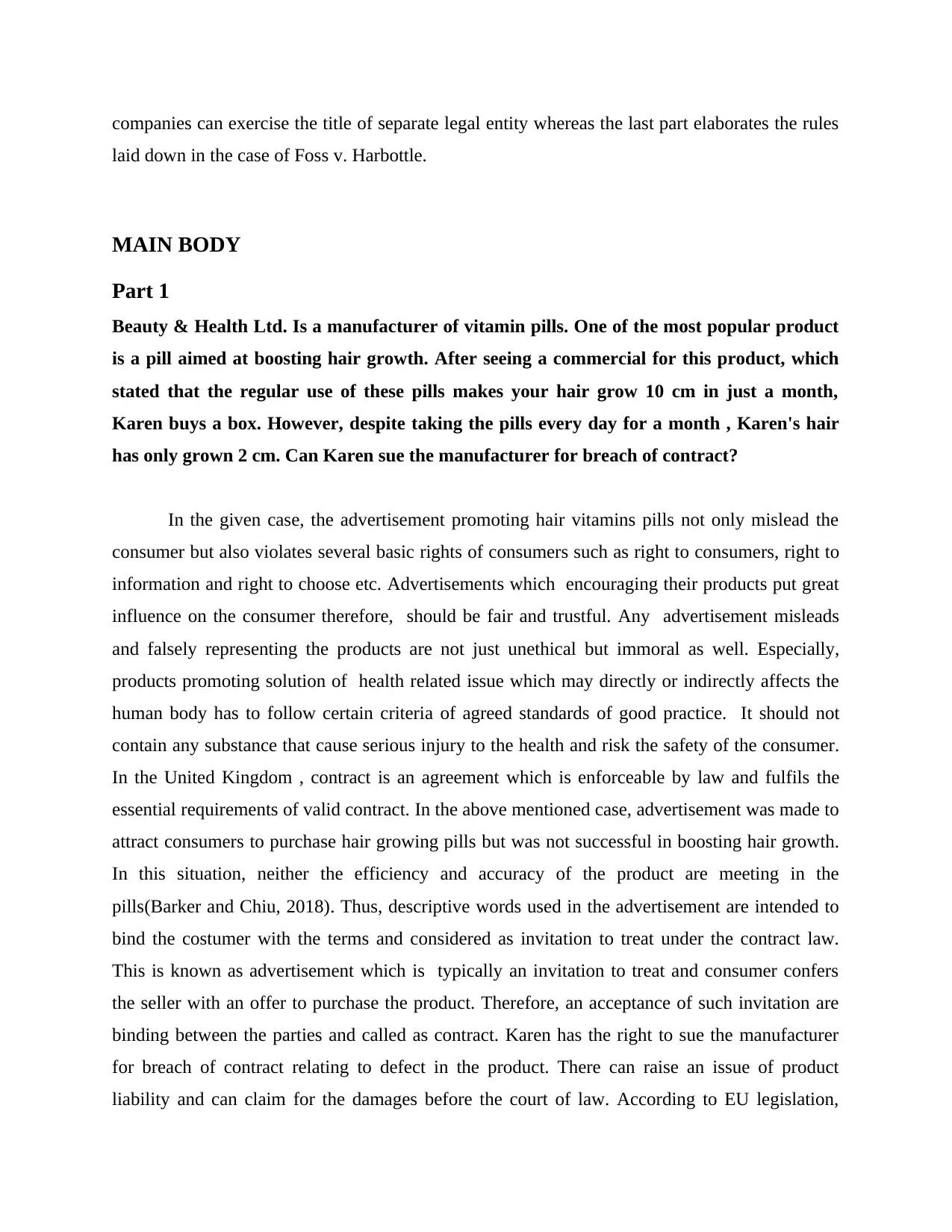
companies can exercise the title of separate legal entity whereas the last part elaborates the rules
laid down in the case of Foss v. Harbottle.
MAIN BODY
Part 1
Beauty & Health Ltd. Is a manufacturer of vitamin pills. One of the most popular product
is a pill aimed at boosting hair growth. After seeing a commercial for this product, which
stated that the regular use of these pills makes your hair grow 10 cm in just a month,
Karen buys a box. However, despite taking the pills every day for a month , Karen's hair
has only grown 2 cm. Can Karen sue the manufacturer for breach of contract?
In the given case, the advertisement promoting hair vitamins pills not only mislead the
consumer but also violates several basic rights of consumers such as right to consumers, right to
information and right to choose etc. Advertisements which encouraging their products put great
influence on the consumer therefore, should be fair and trustful. Any advertisement misleads
and falsely representing the products are not just unethical but immoral as well. Especially,
products promoting solution of health related issue which may directly or indirectly affects the
human body has to follow certain criteria of agreed standards of good practice. It should not
contain any substance that cause serious injury to the health and risk the safety of the consumer.
In the United Kingdom , contract is an agreement which is enforceable by law and fulfils the
essential requirements of valid contract. In the above mentioned case, advertisement was made to
attract consumers to purchase hair growing pills but was not successful in boosting hair growth.
In this situation, neither the efficiency and accuracy of the product are meeting in the
pills(Barker and Chiu, 2018). Thus, descriptive words used in the advertisement are intended to
bind the costumer with the terms and considered as invitation to treat under the contract law.
This is known as advertisement which is typically an invitation to treat and consumer confers
the seller with an offer to purchase the product. Therefore, an acceptance of such invitation are
binding between the parties and called as contract. Karen has the right to sue the manufacturer
for breach of contract relating to defect in the product. There can raise an issue of product
liability and can claim for the damages before the court of law. According to EU legislation,
laid down in the case of Foss v. Harbottle.
MAIN BODY
Part 1
Beauty & Health Ltd. Is a manufacturer of vitamin pills. One of the most popular product
is a pill aimed at boosting hair growth. After seeing a commercial for this product, which
stated that the regular use of these pills makes your hair grow 10 cm in just a month,
Karen buys a box. However, despite taking the pills every day for a month , Karen's hair
has only grown 2 cm. Can Karen sue the manufacturer for breach of contract?
In the given case, the advertisement promoting hair vitamins pills not only mislead the
consumer but also violates several basic rights of consumers such as right to consumers, right to
information and right to choose etc. Advertisements which encouraging their products put great
influence on the consumer therefore, should be fair and trustful. Any advertisement misleads
and falsely representing the products are not just unethical but immoral as well. Especially,
products promoting solution of health related issue which may directly or indirectly affects the
human body has to follow certain criteria of agreed standards of good practice. It should not
contain any substance that cause serious injury to the health and risk the safety of the consumer.
In the United Kingdom , contract is an agreement which is enforceable by law and fulfils the
essential requirements of valid contract. In the above mentioned case, advertisement was made to
attract consumers to purchase hair growing pills but was not successful in boosting hair growth.
In this situation, neither the efficiency and accuracy of the product are meeting in the
pills(Barker and Chiu, 2018). Thus, descriptive words used in the advertisement are intended to
bind the costumer with the terms and considered as invitation to treat under the contract law.
This is known as advertisement which is typically an invitation to treat and consumer confers
the seller with an offer to purchase the product. Therefore, an acceptance of such invitation are
binding between the parties and called as contract. Karen has the right to sue the manufacturer
for breach of contract relating to defect in the product. There can raise an issue of product
liability and can claim for the damages before the court of law. According to EU legislation,
⊘ This is a preview!⊘
Do you want full access?
Subscribe today to unlock all pages.

Trusted by 1+ million students worldwide
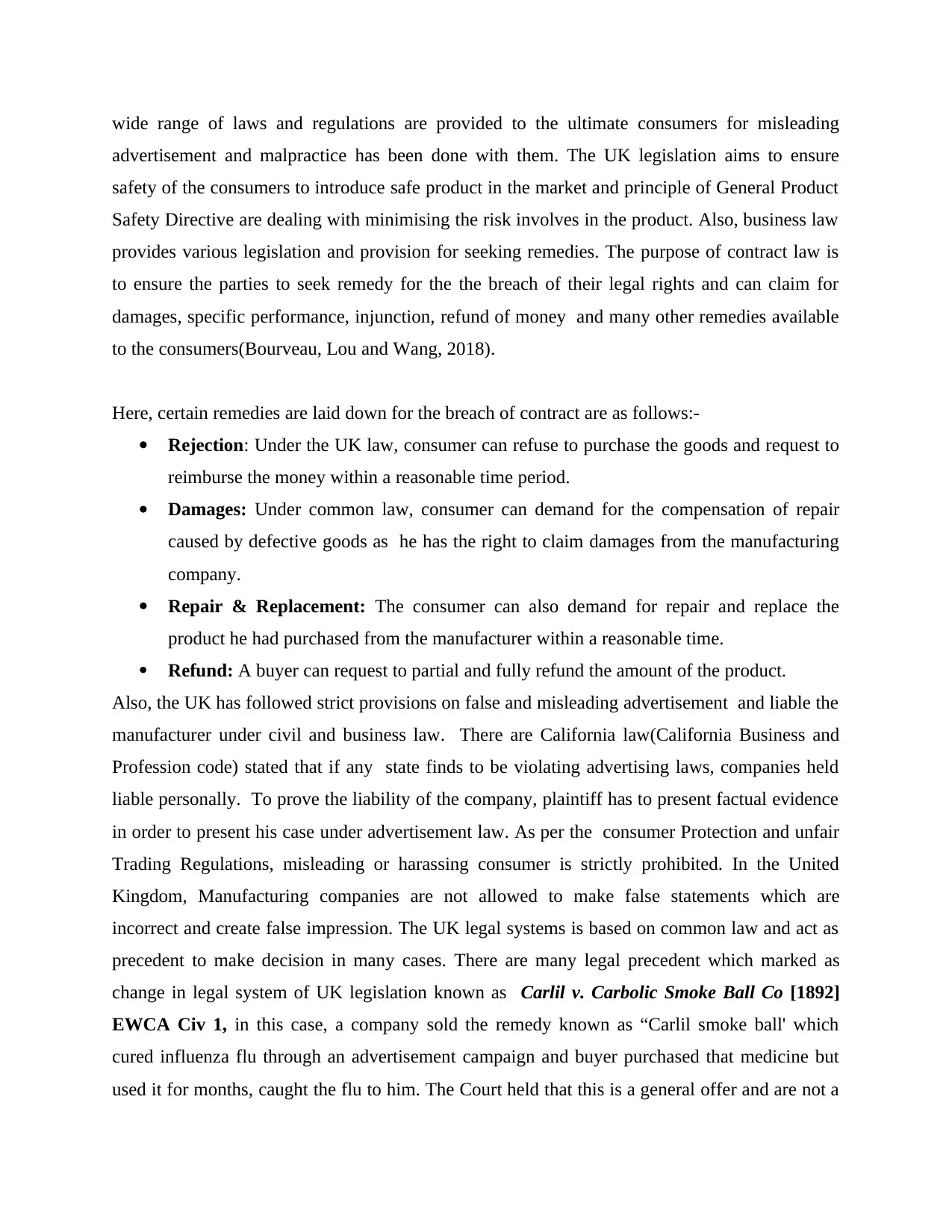
wide range of laws and regulations are provided to the ultimate consumers for misleading
advertisement and malpractice has been done with them. The UK legislation aims to ensure
safety of the consumers to introduce safe product in the market and principle of General Product
Safety Directive are dealing with minimising the risk involves in the product. Also, business law
provides various legislation and provision for seeking remedies. The purpose of contract law is
to ensure the parties to seek remedy for the the breach of their legal rights and can claim for
damages, specific performance, injunction, refund of money and many other remedies available
to the consumers(Bourveau, Lou and Wang, 2018).
Here, certain remedies are laid down for the breach of contract are as follows:-
Rejection: Under the UK law, consumer can refuse to purchase the goods and request to
reimburse the money within a reasonable time period.
Damages: Under common law, consumer can demand for the compensation of repair
caused by defective goods as he has the right to claim damages from the manufacturing
company.
Repair & Replacement: The consumer can also demand for repair and replace the
product he had purchased from the manufacturer within a reasonable time.
Refund: A buyer can request to partial and fully refund the amount of the product.
Also, the UK has followed strict provisions on false and misleading advertisement and liable the
manufacturer under civil and business law. There are California law(California Business and
Profession code) stated that if any state finds to be violating advertising laws, companies held
liable personally. To prove the liability of the company, plaintiff has to present factual evidence
in order to present his case under advertisement law. As per the consumer Protection and unfair
Trading Regulations, misleading or harassing consumer is strictly prohibited. In the United
Kingdom, Manufacturing companies are not allowed to make false statements which are
incorrect and create false impression. The UK legal systems is based on common law and act as
precedent to make decision in many cases. There are many legal precedent which marked as
change in legal system of UK legislation known as Carlil v. Carbolic Smoke Ball Co [1892]
EWCA Civ 1, in this case, a company sold the remedy known as “Carlil smoke ball' which
cured influenza flu through an advertisement campaign and buyer purchased that medicine but
used it for months, caught the flu to him. The Court held that this is a general offer and are not a
advertisement and malpractice has been done with them. The UK legislation aims to ensure
safety of the consumers to introduce safe product in the market and principle of General Product
Safety Directive are dealing with minimising the risk involves in the product. Also, business law
provides various legislation and provision for seeking remedies. The purpose of contract law is
to ensure the parties to seek remedy for the the breach of their legal rights and can claim for
damages, specific performance, injunction, refund of money and many other remedies available
to the consumers(Bourveau, Lou and Wang, 2018).
Here, certain remedies are laid down for the breach of contract are as follows:-
Rejection: Under the UK law, consumer can refuse to purchase the goods and request to
reimburse the money within a reasonable time period.
Damages: Under common law, consumer can demand for the compensation of repair
caused by defective goods as he has the right to claim damages from the manufacturing
company.
Repair & Replacement: The consumer can also demand for repair and replace the
product he had purchased from the manufacturer within a reasonable time.
Refund: A buyer can request to partial and fully refund the amount of the product.
Also, the UK has followed strict provisions on false and misleading advertisement and liable the
manufacturer under civil and business law. There are California law(California Business and
Profession code) stated that if any state finds to be violating advertising laws, companies held
liable personally. To prove the liability of the company, plaintiff has to present factual evidence
in order to present his case under advertisement law. As per the consumer Protection and unfair
Trading Regulations, misleading or harassing consumer is strictly prohibited. In the United
Kingdom, Manufacturing companies are not allowed to make false statements which are
incorrect and create false impression. The UK legal systems is based on common law and act as
precedent to make decision in many cases. There are many legal precedent which marked as
change in legal system of UK legislation known as Carlil v. Carbolic Smoke Ball Co [1892]
EWCA Civ 1, in this case, a company sold the remedy known as “Carlil smoke ball' which
cured influenza flu through an advertisement campaign and buyer purchased that medicine but
used it for months, caught the flu to him. The Court held that this is a general offer and are not a
Paraphrase This Document
Need a fresh take? Get an instant paraphrase of this document with our AI Paraphraser
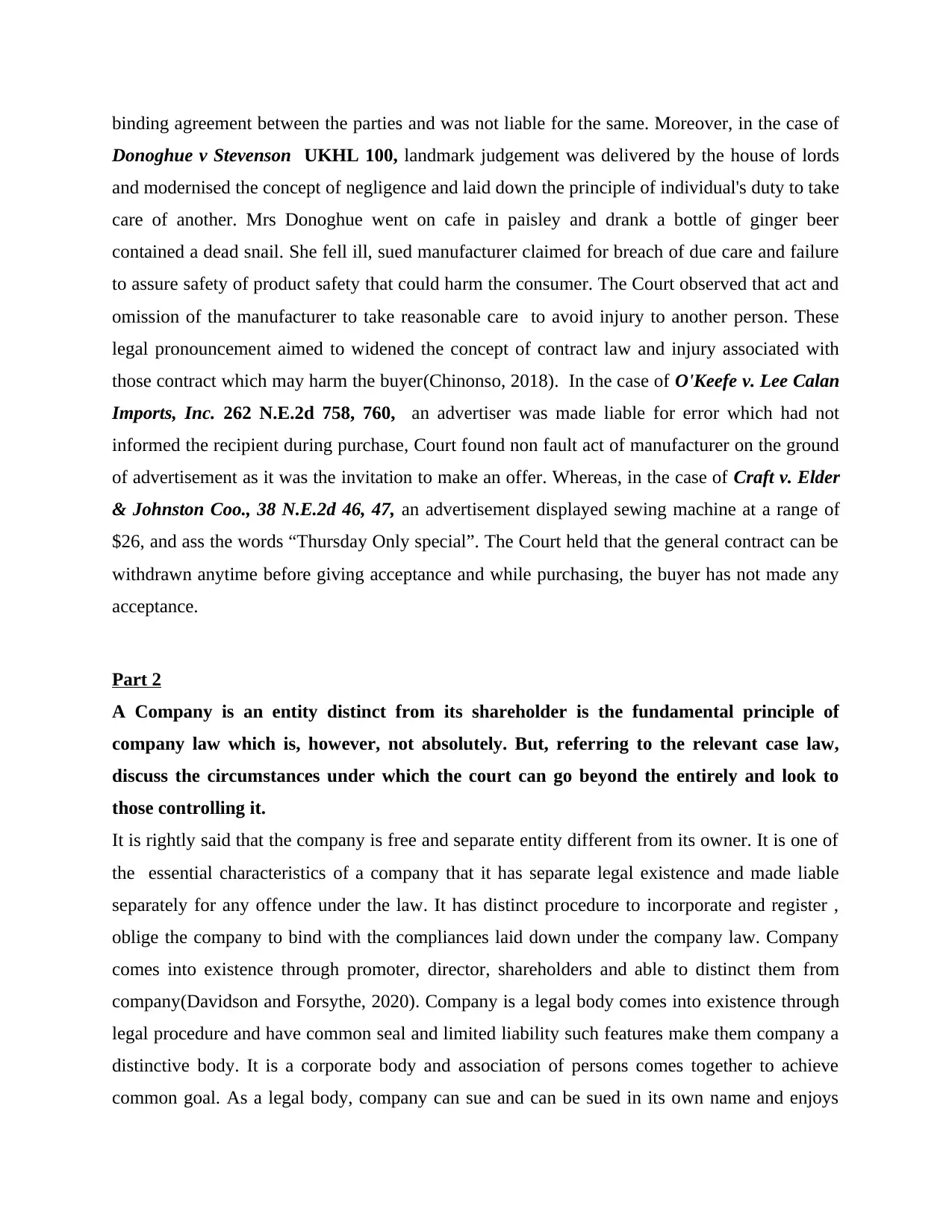
binding agreement between the parties and was not liable for the same. Moreover, in the case of
Donoghue v Stevenson UKHL 100, landmark judgement was delivered by the house of lords
and modernised the concept of negligence and laid down the principle of individual's duty to take
care of another. Mrs Donoghue went on cafe in paisley and drank a bottle of ginger beer
contained a dead snail. She fell ill, sued manufacturer claimed for breach of due care and failure
to assure safety of product safety that could harm the consumer. The Court observed that act and
omission of the manufacturer to take reasonable care to avoid injury to another person. These
legal pronouncement aimed to widened the concept of contract law and injury associated with
those contract which may harm the buyer(Chinonso, 2018). In the case of O'Keefe v. Lee Calan
Imports, Inc. 262 N.E.2d 758, 760, an advertiser was made liable for error which had not
informed the recipient during purchase, Court found non fault act of manufacturer on the ground
of advertisement as it was the invitation to make an offer. Whereas, in the case of Craft v. Elder
& Johnston Coo., 38 N.E.2d 46, 47, an advertisement displayed sewing machine at a range of
$26, and ass the words “Thursday Only special”. The Court held that the general contract can be
withdrawn anytime before giving acceptance and while purchasing, the buyer has not made any
acceptance.
Part 2
A Company is an entity distinct from its shareholder is the fundamental principle of
company law which is, however, not absolutely. But, referring to the relevant case law,
discuss the circumstances under which the court can go beyond the entirely and look to
those controlling it.
It is rightly said that the company is free and separate entity different from its owner. It is one of
the essential characteristics of a company that it has separate legal existence and made liable
separately for any offence under the law. It has distinct procedure to incorporate and register ,
oblige the company to bind with the compliances laid down under the company law. Company
comes into existence through promoter, director, shareholders and able to distinct them from
company(Davidson and Forsythe, 2020). Company is a legal body comes into existence through
legal procedure and have common seal and limited liability such features make them company a
distinctive body. It is a corporate body and association of persons comes together to achieve
common goal. As a legal body, company can sue and can be sued in its own name and enjoys
Donoghue v Stevenson UKHL 100, landmark judgement was delivered by the house of lords
and modernised the concept of negligence and laid down the principle of individual's duty to take
care of another. Mrs Donoghue went on cafe in paisley and drank a bottle of ginger beer
contained a dead snail. She fell ill, sued manufacturer claimed for breach of due care and failure
to assure safety of product safety that could harm the consumer. The Court observed that act and
omission of the manufacturer to take reasonable care to avoid injury to another person. These
legal pronouncement aimed to widened the concept of contract law and injury associated with
those contract which may harm the buyer(Chinonso, 2018). In the case of O'Keefe v. Lee Calan
Imports, Inc. 262 N.E.2d 758, 760, an advertiser was made liable for error which had not
informed the recipient during purchase, Court found non fault act of manufacturer on the ground
of advertisement as it was the invitation to make an offer. Whereas, in the case of Craft v. Elder
& Johnston Coo., 38 N.E.2d 46, 47, an advertisement displayed sewing machine at a range of
$26, and ass the words “Thursday Only special”. The Court held that the general contract can be
withdrawn anytime before giving acceptance and while purchasing, the buyer has not made any
acceptance.
Part 2
A Company is an entity distinct from its shareholder is the fundamental principle of
company law which is, however, not absolutely. But, referring to the relevant case law,
discuss the circumstances under which the court can go beyond the entirely and look to
those controlling it.
It is rightly said that the company is free and separate entity different from its owner. It is one of
the essential characteristics of a company that it has separate legal existence and made liable
separately for any offence under the law. It has distinct procedure to incorporate and register ,
oblige the company to bind with the compliances laid down under the company law. Company
comes into existence through promoter, director, shareholders and able to distinct them from
company(Davidson and Forsythe, 2020). Company is a legal body comes into existence through
legal procedure and have common seal and limited liability such features make them company a
distinctive body. It is a corporate body and association of persons comes together to achieve
common goal. As a legal body, company can sue and can be sued in its own name and enjoys
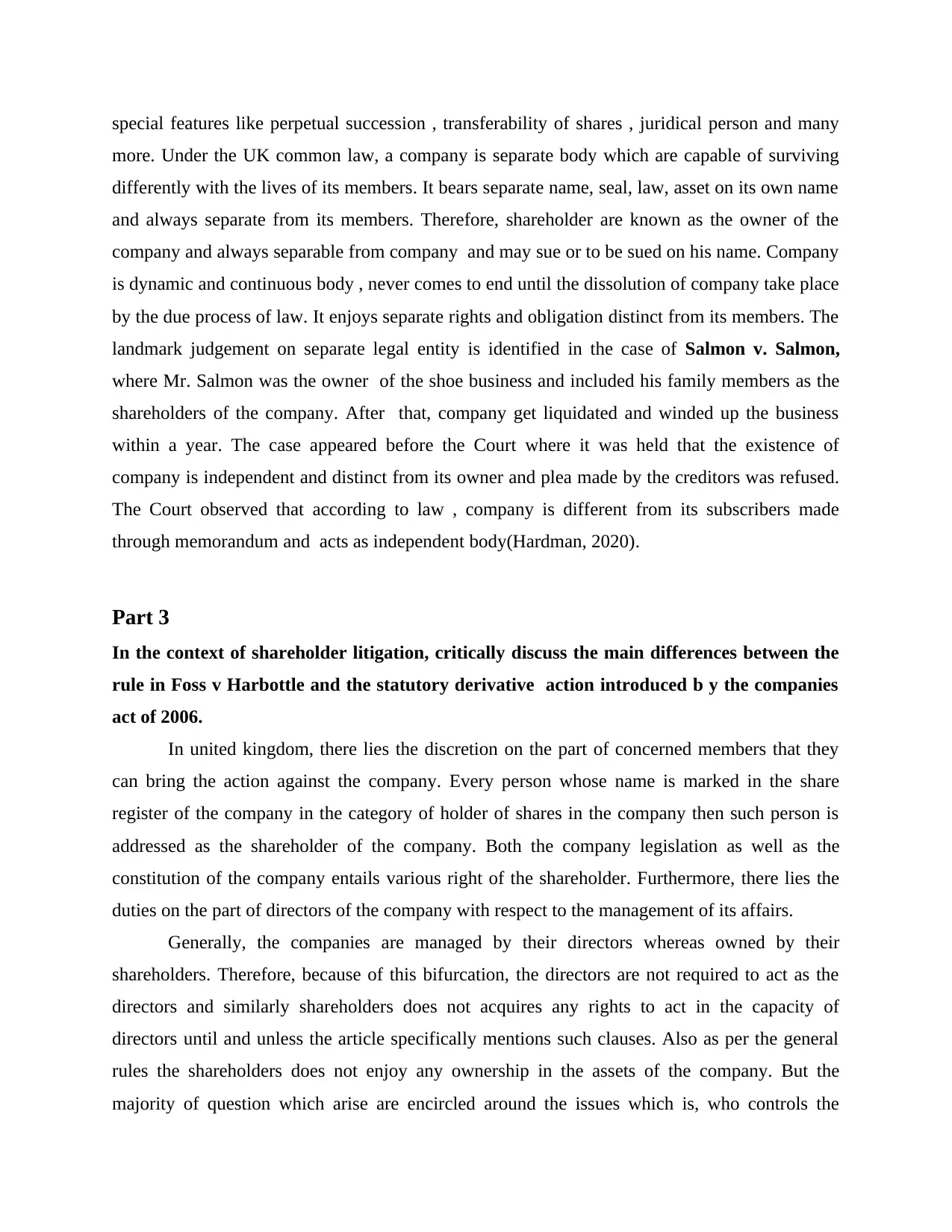
special features like perpetual succession , transferability of shares , juridical person and many
more. Under the UK common law, a company is separate body which are capable of surviving
differently with the lives of its members. It bears separate name, seal, law, asset on its own name
and always separate from its members. Therefore, shareholder are known as the owner of the
company and always separable from company and may sue or to be sued on his name. Company
is dynamic and continuous body , never comes to end until the dissolution of company take place
by the due process of law. It enjoys separate rights and obligation distinct from its members. The
landmark judgement on separate legal entity is identified in the case of Salmon v. Salmon,
where Mr. Salmon was the owner of the shoe business and included his family members as the
shareholders of the company. After that, company get liquidated and winded up the business
within a year. The case appeared before the Court where it was held that the existence of
company is independent and distinct from its owner and plea made by the creditors was refused.
The Court observed that according to law , company is different from its subscribers made
through memorandum and acts as independent body(Hardman, 2020).
Part 3
In the context of shareholder litigation, critically discuss the main differences between the
rule in Foss v Harbottle and the statutory derivative action introduced b y the companies
act of 2006.
In united kingdom, there lies the discretion on the part of concerned members that they
can bring the action against the company. Every person whose name is marked in the share
register of the company in the category of holder of shares in the company then such person is
addressed as the shareholder of the company. Both the company legislation as well as the
constitution of the company entails various right of the shareholder. Furthermore, there lies the
duties on the part of directors of the company with respect to the management of its affairs.
Generally, the companies are managed by their directors whereas owned by their
shareholders. Therefore, because of this bifurcation, the directors are not required to act as the
directors and similarly shareholders does not acquires any rights to act in the capacity of
directors until and unless the article specifically mentions such clauses. Also as per the general
rules the shareholders does not enjoy any ownership in the assets of the company. But the
majority of question which arise are encircled around the issues which is, who controls the
more. Under the UK common law, a company is separate body which are capable of surviving
differently with the lives of its members. It bears separate name, seal, law, asset on its own name
and always separate from its members. Therefore, shareholder are known as the owner of the
company and always separable from company and may sue or to be sued on his name. Company
is dynamic and continuous body , never comes to end until the dissolution of company take place
by the due process of law. It enjoys separate rights and obligation distinct from its members. The
landmark judgement on separate legal entity is identified in the case of Salmon v. Salmon,
where Mr. Salmon was the owner of the shoe business and included his family members as the
shareholders of the company. After that, company get liquidated and winded up the business
within a year. The case appeared before the Court where it was held that the existence of
company is independent and distinct from its owner and plea made by the creditors was refused.
The Court observed that according to law , company is different from its subscribers made
through memorandum and acts as independent body(Hardman, 2020).
Part 3
In the context of shareholder litigation, critically discuss the main differences between the
rule in Foss v Harbottle and the statutory derivative action introduced b y the companies
act of 2006.
In united kingdom, there lies the discretion on the part of concerned members that they
can bring the action against the company. Every person whose name is marked in the share
register of the company in the category of holder of shares in the company then such person is
addressed as the shareholder of the company. Both the company legislation as well as the
constitution of the company entails various right of the shareholder. Furthermore, there lies the
duties on the part of directors of the company with respect to the management of its affairs.
Generally, the companies are managed by their directors whereas owned by their
shareholders. Therefore, because of this bifurcation, the directors are not required to act as the
directors and similarly shareholders does not acquires any rights to act in the capacity of
directors until and unless the article specifically mentions such clauses. Also as per the general
rules the shareholders does not enjoy any ownership in the assets of the company. But the
majority of question which arise are encircled around the issues which is, who controls the
⊘ This is a preview!⊘
Do you want full access?
Subscribe today to unlock all pages.

Trusted by 1+ million students worldwide
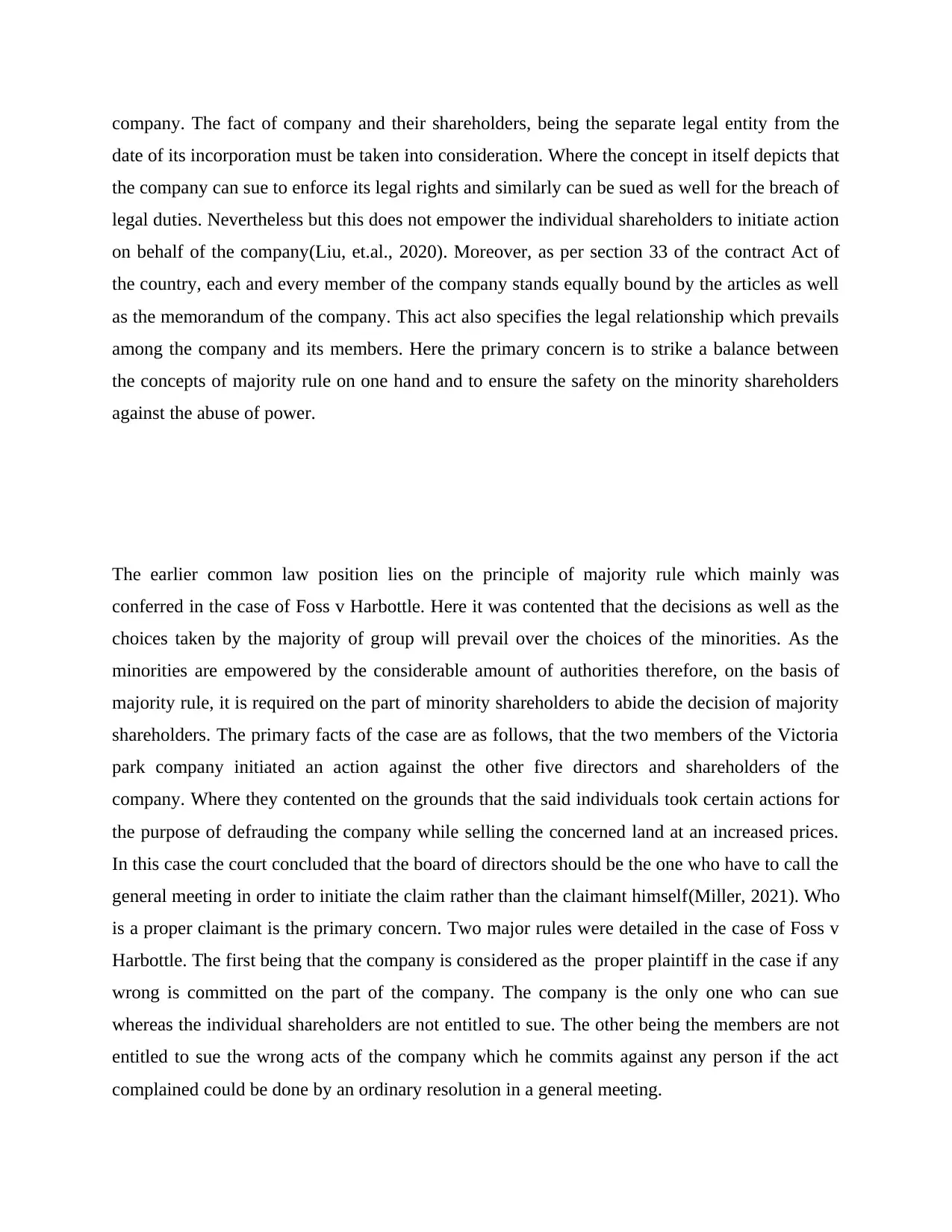
company. The fact of company and their shareholders, being the separate legal entity from the
date of its incorporation must be taken into consideration. Where the concept in itself depicts that
the company can sue to enforce its legal rights and similarly can be sued as well for the breach of
legal duties. Nevertheless but this does not empower the individual shareholders to initiate action
on behalf of the company(Liu, et.al., 2020). Moreover, as per section 33 of the contract Act of
the country, each and every member of the company stands equally bound by the articles as well
as the memorandum of the company. This act also specifies the legal relationship which prevails
among the company and its members. Here the primary concern is to strike a balance between
the concepts of majority rule on one hand and to ensure the safety on the minority shareholders
against the abuse of power.
The earlier common law position lies on the principle of majority rule which mainly was
conferred in the case of Foss v Harbottle. Here it was contented that the decisions as well as the
choices taken by the majority of group will prevail over the choices of the minorities. As the
minorities are empowered by the considerable amount of authorities therefore, on the basis of
majority rule, it is required on the part of minority shareholders to abide the decision of majority
shareholders. The primary facts of the case are as follows, that the two members of the Victoria
park company initiated an action against the other five directors and shareholders of the
company. Where they contented on the grounds that the said individuals took certain actions for
the purpose of defrauding the company while selling the concerned land at an increased prices.
In this case the court concluded that the board of directors should be the one who have to call the
general meeting in order to initiate the claim rather than the claimant himself(Miller, 2021). Who
is a proper claimant is the primary concern. Two major rules were detailed in the case of Foss v
Harbottle. The first being that the company is considered as the proper plaintiff in the case if any
wrong is committed on the part of the company. The company is the only one who can sue
whereas the individual shareholders are not entitled to sue. The other being the members are not
entitled to sue the wrong acts of the company which he commits against any person if the act
complained could be done by an ordinary resolution in a general meeting.
date of its incorporation must be taken into consideration. Where the concept in itself depicts that
the company can sue to enforce its legal rights and similarly can be sued as well for the breach of
legal duties. Nevertheless but this does not empower the individual shareholders to initiate action
on behalf of the company(Liu, et.al., 2020). Moreover, as per section 33 of the contract Act of
the country, each and every member of the company stands equally bound by the articles as well
as the memorandum of the company. This act also specifies the legal relationship which prevails
among the company and its members. Here the primary concern is to strike a balance between
the concepts of majority rule on one hand and to ensure the safety on the minority shareholders
against the abuse of power.
The earlier common law position lies on the principle of majority rule which mainly was
conferred in the case of Foss v Harbottle. Here it was contented that the decisions as well as the
choices taken by the majority of group will prevail over the choices of the minorities. As the
minorities are empowered by the considerable amount of authorities therefore, on the basis of
majority rule, it is required on the part of minority shareholders to abide the decision of majority
shareholders. The primary facts of the case are as follows, that the two members of the Victoria
park company initiated an action against the other five directors and shareholders of the
company. Where they contented on the grounds that the said individuals took certain actions for
the purpose of defrauding the company while selling the concerned land at an increased prices.
In this case the court concluded that the board of directors should be the one who have to call the
general meeting in order to initiate the claim rather than the claimant himself(Miller, 2021). Who
is a proper claimant is the primary concern. Two major rules were detailed in the case of Foss v
Harbottle. The first being that the company is considered as the proper plaintiff in the case if any
wrong is committed on the part of the company. The company is the only one who can sue
whereas the individual shareholders are not entitled to sue. The other being the members are not
entitled to sue the wrong acts of the company which he commits against any person if the act
complained could be done by an ordinary resolution in a general meeting.
Paraphrase This Document
Need a fresh take? Get an instant paraphrase of this document with our AI Paraphraser
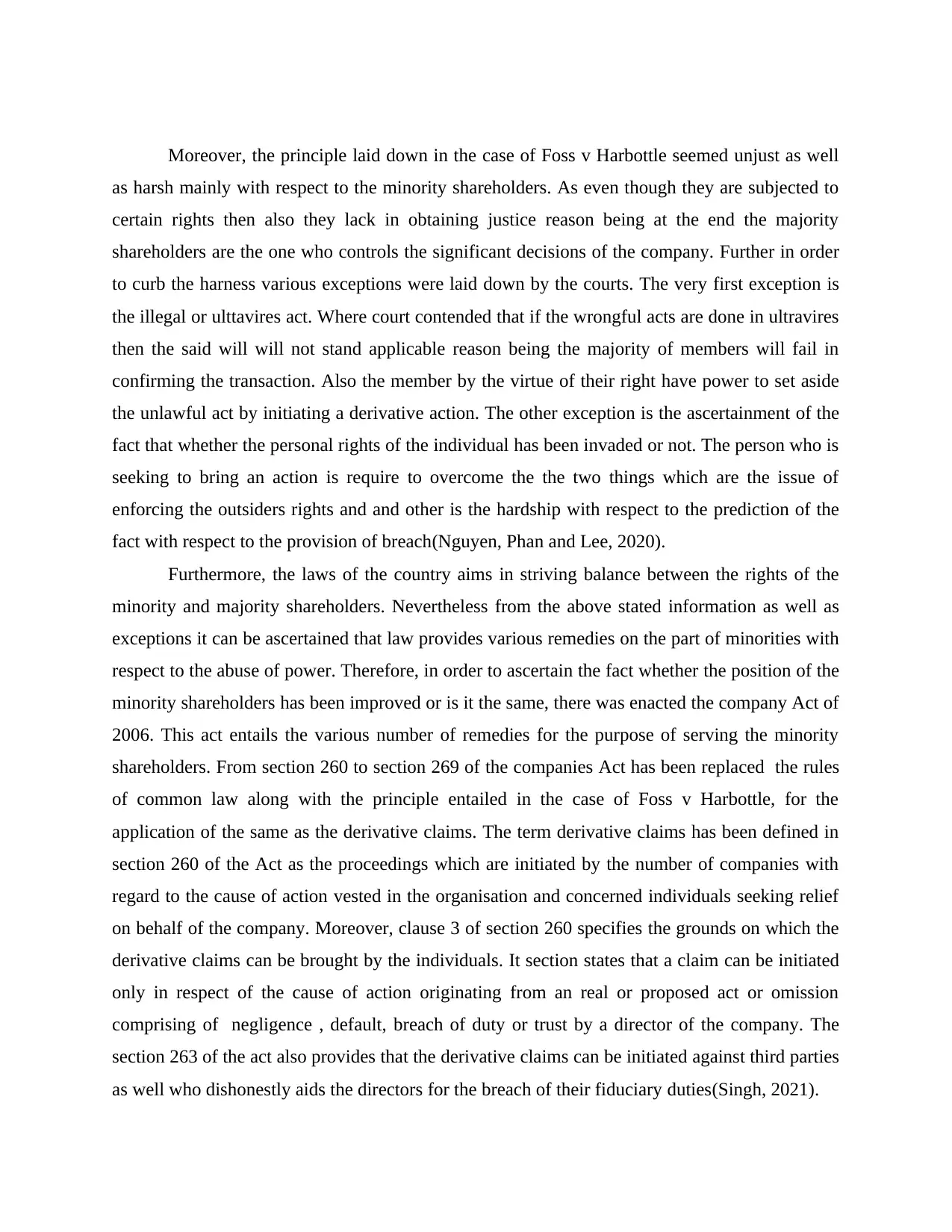
Moreover, the principle laid down in the case of Foss v Harbottle seemed unjust as well
as harsh mainly with respect to the minority shareholders. As even though they are subjected to
certain rights then also they lack in obtaining justice reason being at the end the majority
shareholders are the one who controls the significant decisions of the company. Further in order
to curb the harness various exceptions were laid down by the courts. The very first exception is
the illegal or ulttavires act. Where court contended that if the wrongful acts are done in ultravires
then the said will will not stand applicable reason being the majority of members will fail in
confirming the transaction. Also the member by the virtue of their right have power to set aside
the unlawful act by initiating a derivative action. The other exception is the ascertainment of the
fact that whether the personal rights of the individual has been invaded or not. The person who is
seeking to bring an action is require to overcome the the two things which are the issue of
enforcing the outsiders rights and and other is the hardship with respect to the prediction of the
fact with respect to the provision of breach(Nguyen, Phan and Lee, 2020).
Furthermore, the laws of the country aims in striving balance between the rights of the
minority and majority shareholders. Nevertheless from the above stated information as well as
exceptions it can be ascertained that law provides various remedies on the part of minorities with
respect to the abuse of power. Therefore, in order to ascertain the fact whether the position of the
minority shareholders has been improved or is it the same, there was enacted the company Act of
2006. This act entails the various number of remedies for the purpose of serving the minority
shareholders. From section 260 to section 269 of the companies Act has been replaced the rules
of common law along with the principle entailed in the case of Foss v Harbottle, for the
application of the same as the derivative claims. The term derivative claims has been defined in
section 260 of the Act as the proceedings which are initiated by the number of companies with
regard to the cause of action vested in the organisation and concerned individuals seeking relief
on behalf of the company. Moreover, clause 3 of section 260 specifies the grounds on which the
derivative claims can be brought by the individuals. It section states that a claim can be initiated
only in respect of the cause of action originating from an real or proposed act or omission
comprising of negligence , default, breach of duty or trust by a director of the company. The
section 263 of the act also provides that the derivative claims can be initiated against third parties
as well who dishonestly aids the directors for the breach of their fiduciary duties(Singh, 2021).
as harsh mainly with respect to the minority shareholders. As even though they are subjected to
certain rights then also they lack in obtaining justice reason being at the end the majority
shareholders are the one who controls the significant decisions of the company. Further in order
to curb the harness various exceptions were laid down by the courts. The very first exception is
the illegal or ulttavires act. Where court contended that if the wrongful acts are done in ultravires
then the said will will not stand applicable reason being the majority of members will fail in
confirming the transaction. Also the member by the virtue of their right have power to set aside
the unlawful act by initiating a derivative action. The other exception is the ascertainment of the
fact that whether the personal rights of the individual has been invaded or not. The person who is
seeking to bring an action is require to overcome the the two things which are the issue of
enforcing the outsiders rights and and other is the hardship with respect to the prediction of the
fact with respect to the provision of breach(Nguyen, Phan and Lee, 2020).
Furthermore, the laws of the country aims in striving balance between the rights of the
minority and majority shareholders. Nevertheless from the above stated information as well as
exceptions it can be ascertained that law provides various remedies on the part of minorities with
respect to the abuse of power. Therefore, in order to ascertain the fact whether the position of the
minority shareholders has been improved or is it the same, there was enacted the company Act of
2006. This act entails the various number of remedies for the purpose of serving the minority
shareholders. From section 260 to section 269 of the companies Act has been replaced the rules
of common law along with the principle entailed in the case of Foss v Harbottle, for the
application of the same as the derivative claims. The term derivative claims has been defined in
section 260 of the Act as the proceedings which are initiated by the number of companies with
regard to the cause of action vested in the organisation and concerned individuals seeking relief
on behalf of the company. Moreover, clause 3 of section 260 specifies the grounds on which the
derivative claims can be brought by the individuals. It section states that a claim can be initiated
only in respect of the cause of action originating from an real or proposed act or omission
comprising of negligence , default, breach of duty or trust by a director of the company. The
section 263 of the act also provides that the derivative claims can be initiated against third parties
as well who dishonestly aids the directors for the breach of their fiduciary duties(Singh, 2021).
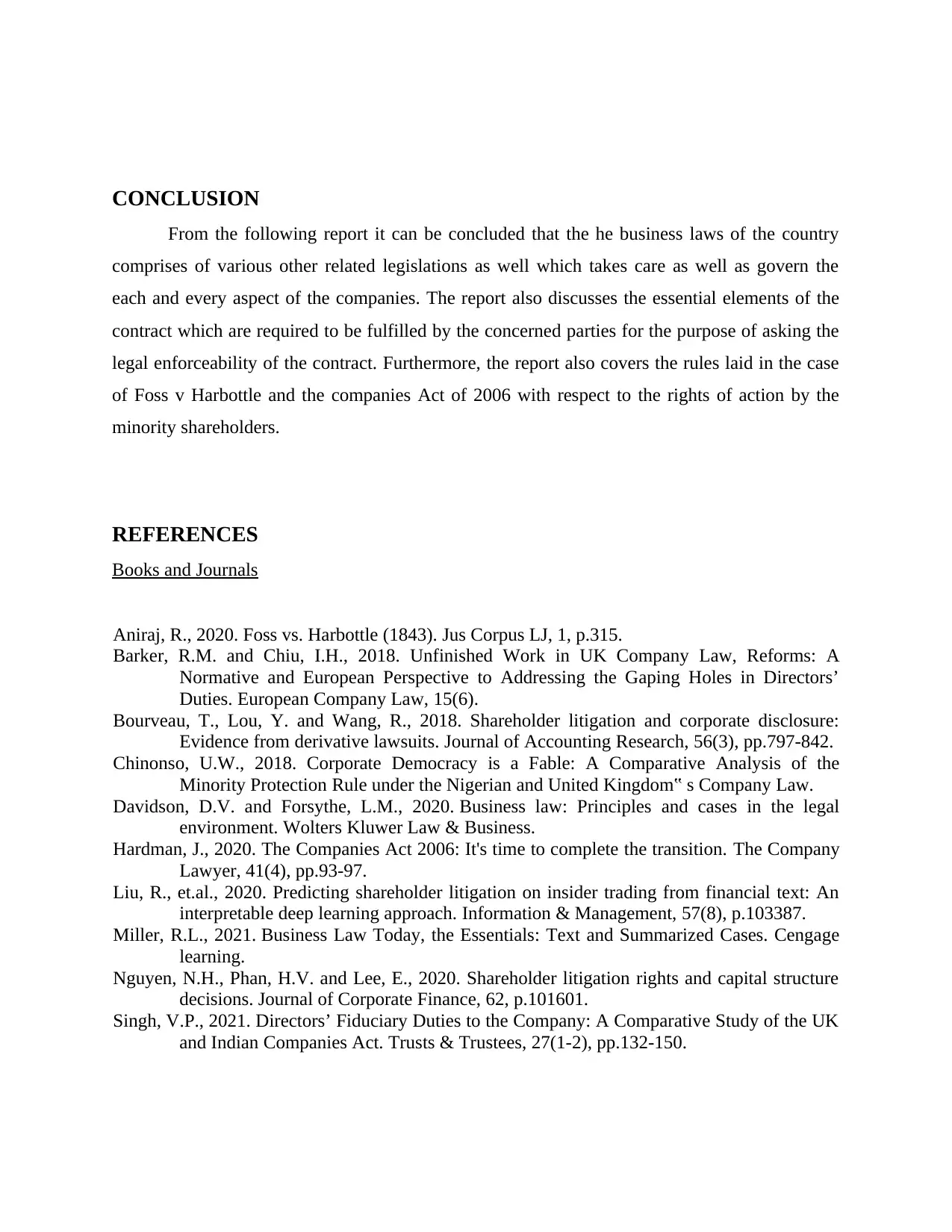
CONCLUSION
From the following report it can be concluded that the he business laws of the country
comprises of various other related legislations as well which takes care as well as govern the
each and every aspect of the companies. The report also discusses the essential elements of the
contract which are required to be fulfilled by the concerned parties for the purpose of asking the
legal enforceability of the contract. Furthermore, the report also covers the rules laid in the case
of Foss v Harbottle and the companies Act of 2006 with respect to the rights of action by the
minority shareholders.
REFERENCES
Books and Journals
Aniraj, R., 2020. Foss vs. Harbottle (1843). Jus Corpus LJ, 1, p.315.
Barker, R.M. and Chiu, I.H., 2018. Unfinished Work in UK Company Law, Reforms: A
Normative and European Perspective to Addressing the Gaping Holes in Directors’
Duties. European Company Law, 15(6).
Bourveau, T., Lou, Y. and Wang, R., 2018. Shareholder litigation and corporate disclosure:
Evidence from derivative lawsuits. Journal of Accounting Research, 56(3), pp.797-842.
Chinonso, U.W., 2018. Corporate Democracy is a Fable: A Comparative Analysis of the
Minority Protection Rule under the Nigerian and United Kingdom‟ s Company Law.
Davidson, D.V. and Forsythe, L.M., 2020. Business law: Principles and cases in the legal
environment. Wolters Kluwer Law & Business.
Hardman, J., 2020. The Companies Act 2006: It's time to complete the transition. The Company
Lawyer, 41(4), pp.93-97.
Liu, R., et.al., 2020. Predicting shareholder litigation on insider trading from financial text: An
interpretable deep learning approach. Information & Management, 57(8), p.103387.
Miller, R.L., 2021. Business Law Today, the Essentials: Text and Summarized Cases. Cengage
learning.
Nguyen, N.H., Phan, H.V. and Lee, E., 2020. Shareholder litigation rights and capital structure
decisions. Journal of Corporate Finance, 62, p.101601.
Singh, V.P., 2021. Directors’ Fiduciary Duties to the Company: A Comparative Study of the UK
and Indian Companies Act. Trusts & Trustees, 27(1-2), pp.132-150.
From the following report it can be concluded that the he business laws of the country
comprises of various other related legislations as well which takes care as well as govern the
each and every aspect of the companies. The report also discusses the essential elements of the
contract which are required to be fulfilled by the concerned parties for the purpose of asking the
legal enforceability of the contract. Furthermore, the report also covers the rules laid in the case
of Foss v Harbottle and the companies Act of 2006 with respect to the rights of action by the
minority shareholders.
REFERENCES
Books and Journals
Aniraj, R., 2020. Foss vs. Harbottle (1843). Jus Corpus LJ, 1, p.315.
Barker, R.M. and Chiu, I.H., 2018. Unfinished Work in UK Company Law, Reforms: A
Normative and European Perspective to Addressing the Gaping Holes in Directors’
Duties. European Company Law, 15(6).
Bourveau, T., Lou, Y. and Wang, R., 2018. Shareholder litigation and corporate disclosure:
Evidence from derivative lawsuits. Journal of Accounting Research, 56(3), pp.797-842.
Chinonso, U.W., 2018. Corporate Democracy is a Fable: A Comparative Analysis of the
Minority Protection Rule under the Nigerian and United Kingdom‟ s Company Law.
Davidson, D.V. and Forsythe, L.M., 2020. Business law: Principles and cases in the legal
environment. Wolters Kluwer Law & Business.
Hardman, J., 2020. The Companies Act 2006: It's time to complete the transition. The Company
Lawyer, 41(4), pp.93-97.
Liu, R., et.al., 2020. Predicting shareholder litigation on insider trading from financial text: An
interpretable deep learning approach. Information & Management, 57(8), p.103387.
Miller, R.L., 2021. Business Law Today, the Essentials: Text and Summarized Cases. Cengage
learning.
Nguyen, N.H., Phan, H.V. and Lee, E., 2020. Shareholder litigation rights and capital structure
decisions. Journal of Corporate Finance, 62, p.101601.
Singh, V.P., 2021. Directors’ Fiduciary Duties to the Company: A Comparative Study of the UK
and Indian Companies Act. Trusts & Trustees, 27(1-2), pp.132-150.
⊘ This is a preview!⊘
Do you want full access?
Subscribe today to unlock all pages.

Trusted by 1+ million students worldwide

1 out of 10
Related Documents
Your All-in-One AI-Powered Toolkit for Academic Success.
+13062052269
info@desklib.com
Available 24*7 on WhatsApp / Email
![[object Object]](/_next/static/media/star-bottom.7253800d.svg)
Unlock your academic potential
Copyright © 2020–2026 A2Z Services. All Rights Reserved. Developed and managed by ZUCOL.




